新概念英语第2册 L28 第28课 教案
- 格式:pdf
- 大小:1.08 MB
- 文档页数:6
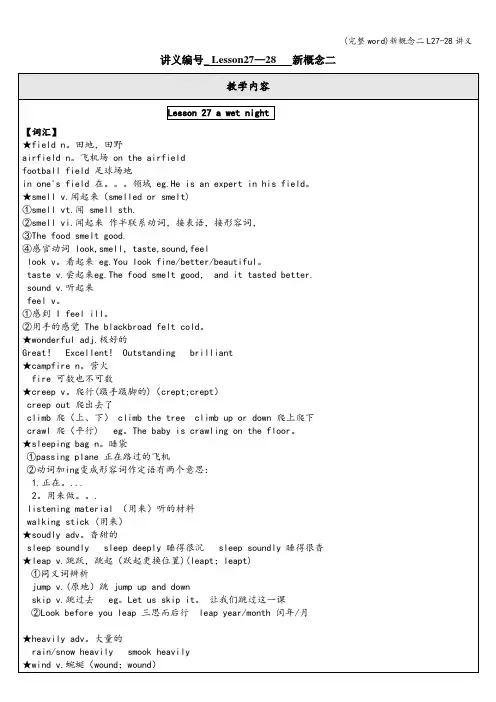
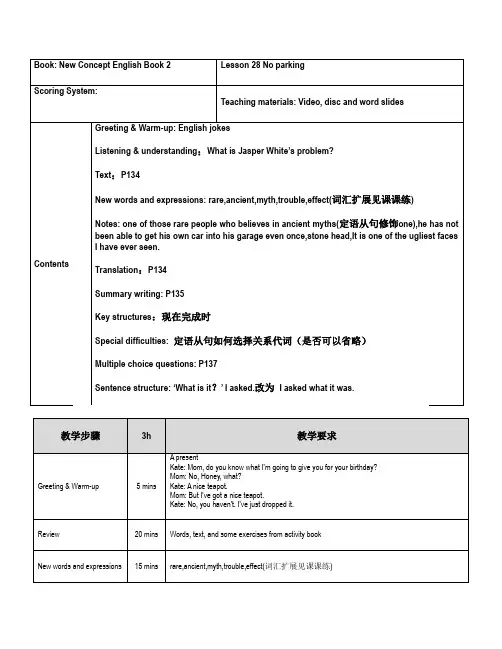
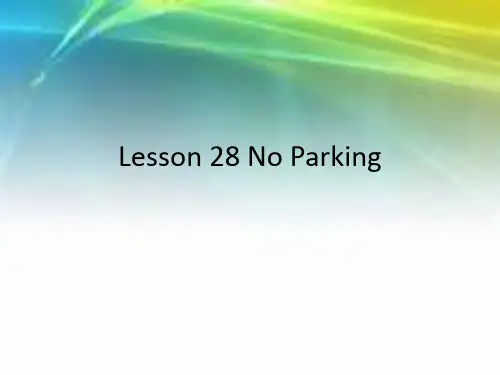
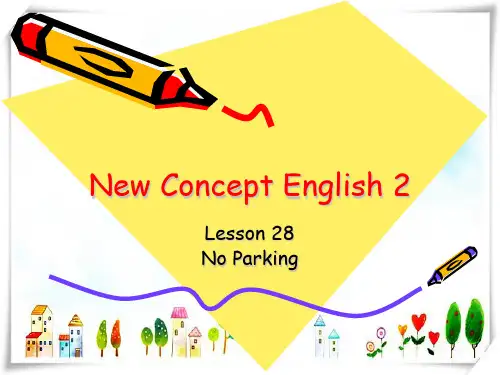
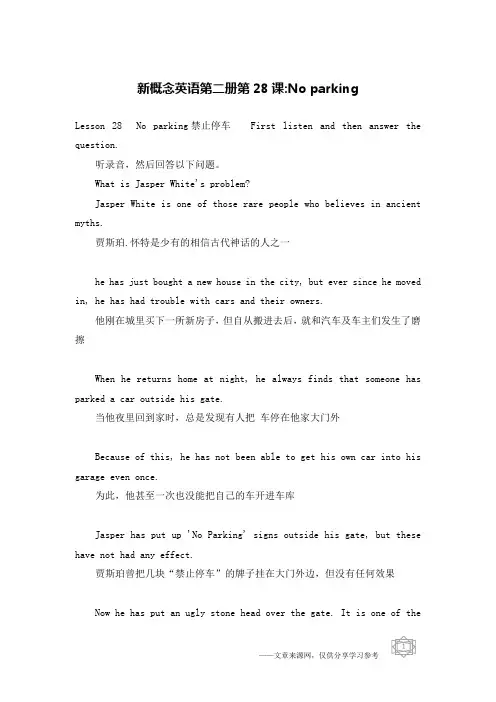
新概念英语第二册第28课:No parkingLesson 28 No parking禁止停车First listen and then answer the question.听录音,然后回答以下问题。
What is Jasper White's problem?Jasper White is one of those rare people who believes in ancient myths.贾斯珀.怀特是少有的相信古代神话的人之一he has just bought a new house in the city, but ever since he moved in, he has had trouble with cars and their owners.他刚在城里买下一所新房子,但自从搬进去后,就和汽车及车主们发生了磨擦When he returns home at night, he always finds that someone has parked a car outside his gate.当他夜里回到家时,总是发现有人把车停在他家大门外Because of this, he has not been able to get his own car into his garage even once.为此,他甚至一次也没能把自己的车开进车库Jasper has put up 'No Parking' signs outside his gate, but these have not had any effect.贾斯珀曾把几块“禁止停车”的牌子挂在大门外边,但没有任何效果Now he has put an ugly stone head over the gate. It is one of theugliest faces I have ever seen.现在他把一个丑陋的石雕头像放在了大门上边,这是我见过的最丑陋的头像之一I asked him what it was and he told me that it was Medusa, the Gorgon.我问他那是什么?他告诉我那是蛇发女怪美杜莎jasper hopes that she will turn cars and their owners to stone. But none of them has been turned to stone yet!贾斯珀希望她把汽车和车主们都变成石头。
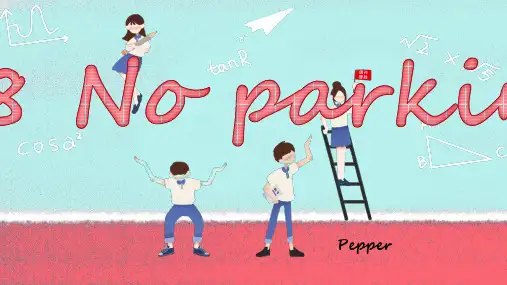
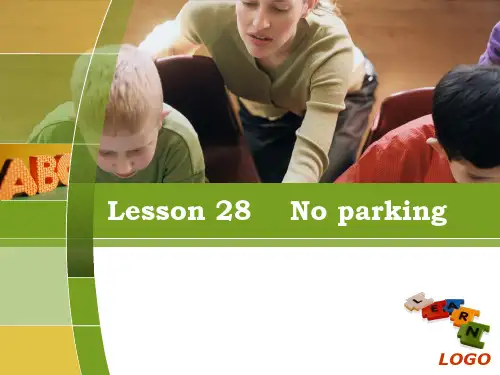
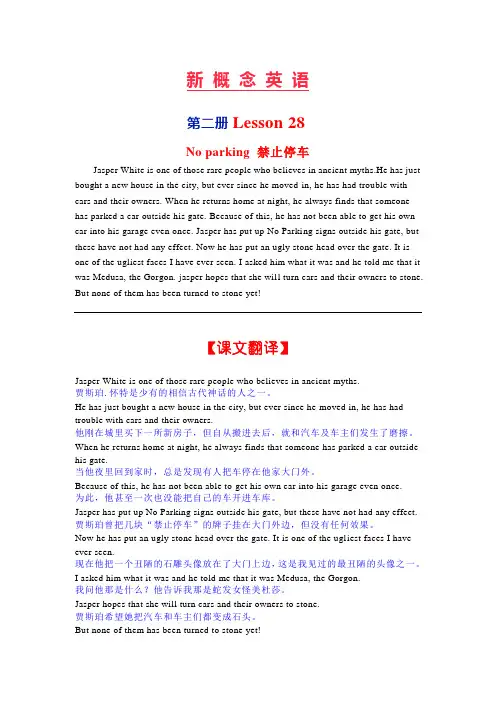
新概念英语第二册Lesson 28No parking 禁止停车Jasper White is one of those rare people who believes in ancient myths.He has just bought a new house in the city, but ever since he moved in, he has had trouble with cars and their owners. When he returns home at night, he always finds that someone has parked a car outside his gate. Because of this, he has not been able to get his own car into his garage even once. Jasper has put up No Parking signs outside his gate, but these have not had any effect. Now he has put an ugly stone head over the gate. It is one of the ugliest faces I have ever seen. I asked him what it was and he told me that it was Medusa, the Gorgon. jasper hopes that she will turn cars and their owners to stone. But none of them has been turned to stone yet!【课文翻译】Jasper White is one of those rare people who believes in ancient myths.贾斯珀.怀特是少有的相信古代神话的人之一。
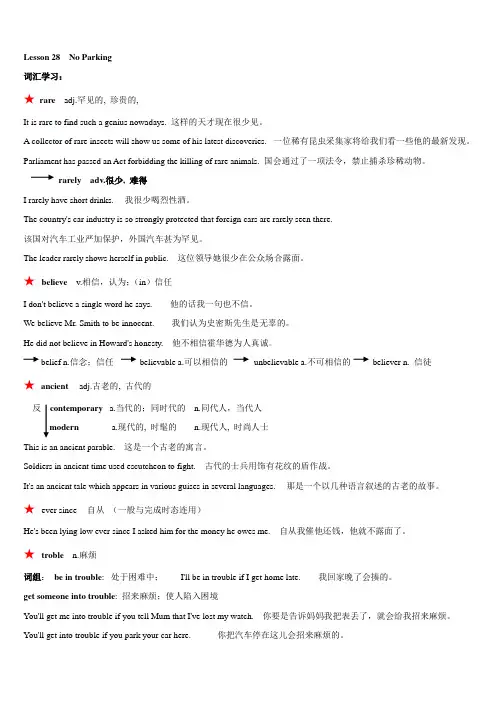
Lesson 28 No Parking词汇学习:★rare adj.罕见的, 珍贵的,It is rare to find such a genius nowadays. 这样的天才现在很少见。
A collector of rare insects will show us some of his latest discoveries. 一位稀有昆虫采集家将给我们看一些他的最新发现。
Parliament has passed an Act forbidding the killing of rare animals. 国会通过了一项法令,禁止捕杀珍稀动物。
rarely adv.很少, 难得I rarely have short drinks. 我很少喝烈性酒。
The country's car industry is so strongly protected that foreign cars are rarely seen there.该国对汽车工业严加保护,外国汽车甚为罕见。
The leader rarely shows herself in public. 这位领导她很少在公众场合露面。
★believe v.相信,认为;(in)信任I don't believe a single word he says. 他的话我一句也不信。
We believe Mr. Smith to be innocent. 我们认为史密斯先生是无辜的。
He did not believe in Howard's honesty. 他不相信霍华德为人真诚。
belief n.信念;信任believable a.可以相信的unbelievable a.不可相信的believer n. 信徒★ancient adj.古老的, 古代的反contemporary a.当代的;同时代的n.同代人,当代人modern a.现代的, 时髦的n.现代人, 时尚人士This is an ancient parable. 这是一个古老的寓言。
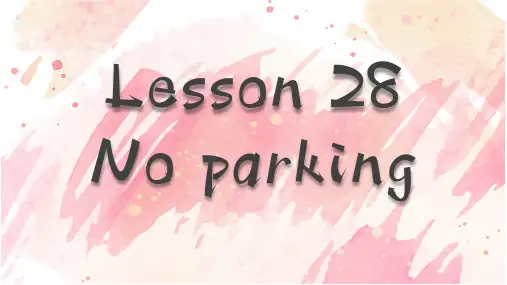
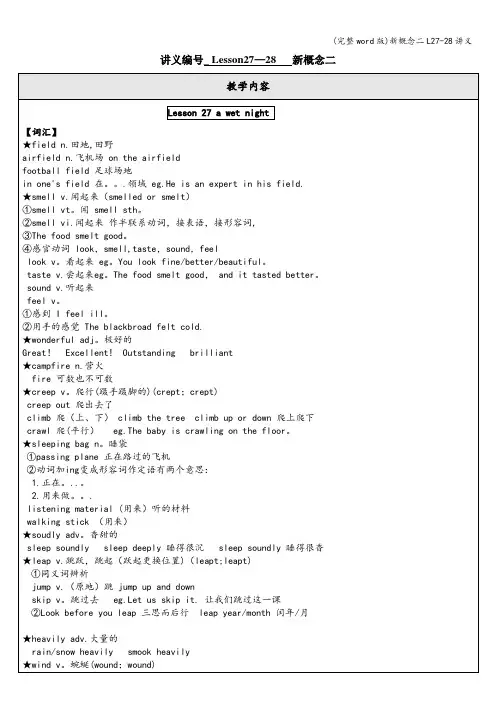
New words and expressions•rare•An event or situation that is rare does not occur very often.• e.g He gives a rare gift to me.•ancient•Ancient means belonging to the distant past, especially to the period in history before the end of the Roman Empire.•Ancient means very old, or having existed for a long time.• e.g I like ancient story very much.•myth• A myth is a well-known story which was made up in the past to explain natural events or to justify religious beliefs or social customs.• e.g It's only a myth.•trouble•You can refer to problems or difficulties as trouble.• e.g You have caused us a lot of trouble.•effect•The effect of one thing on another is the change that the first thing causes in the second thing.• e.g Parents worry about the effect of music on their children.•Gorgon•Any of three winged monstrous sisters, Stheno, Euryale, and Medusa, who had live snakes for hair, huge teeth, and brazen claws.•Medusa•She is a mortal woman who was transformed by Athena into one of the three Gorgons.Her appearance was so hideous that those who looked directly at her were turned to stone.Key structures ---What has happened?•Study these sentences carefully. Pay close attention to the words in italics:•I have just received a letter from my brother, Tim.•I have not seen Tim since last January.•I have not seen Tim for three years.•Tim has been abroad for three years.•Up till now he has won five prizes.•Up till now I have been to New York three times.•I have been to New York three times so far.•Have you been to New York?•Have you seen this film?•Have you read this book?The Present Perfect Tense•Basic structure:Subject +have/has+ past participle+ Object•①Positive sentence:•Subject +has/have+(V-ed)+past participle+ Object•②Negative sentence:•Subject+haven't/hasn't+past participle+ Object•③General question:•Have/Has+ Subject +past participle+ Object ?Key for Key Structures•A•has just bought (1.2)•has had (1.3)•has parked (1.4)•has not been able (1.5)•has put up (1.6)•have not had (1.7)•has put (1.8)•have ever seen (1.9)•has been turned (1.10)Key for Special Difficulties•1. which/ that•2. who / that•3. whose•4. which•5. that•6. that/ which•7. who / thatKey for Multiple Choice Questions • 1. c• 2. d• 3. b• 4. b• 5. c• 6. d•7. b•8. d•9. c•10.d•11.b•12.a。
LESSON 18
Words
1.pub[pʌb](BrE)酒吧;酒馆(在英国英语的口语中较常见)
e.g. 咱们去酒吧喝杯酒吧。
Let’s go to the pub for a drink. bar n. 酒吧
inn n.(AmE)(通常指乡村的,常可夜宿的)小酒店;小旅馆。
ndlord n.房东,地主;店主;老板。
、
3.bill[bil] n.& v.
n. 1)账单
e.g. pay the bill付账单
她总是按时支付账单。
She always pays her bills on time.
买单!Bill, please!
2)(AmE) 纸币
e.g. 一张十美元的钞票a ten-dollar bill
v.
1)vt. ~sb.(for sth.)开账单,发账单
e.g. 请将所购的书开列账单。
Please bill me for the books.
2) vt.~sb./sth. as sth.把(某人或事物)宣传为…
e.g. 他被宣传为新的明星。
He was billed as the new star.
Text
1.After
过去完成时态常同表示时间状语的从属连词after 一同使用,
如:e.g. 他把信全写完后干了些家务活。
After he’d written all her letters, she did some housework.
假如从句中先于主句谓语动词动作发生的那个动词动作很短暂,常可用一般过去时来代替过去完成时态,如:
e.g. 他把猫放出去后,它就跑开钻进了灌木丛。
After she put the cat out, it ran off into the bushes.
(但是,当两个分句为同一主语时,更早发生的那个动作通常用过去完成时态来表示。
如:
e.g. 他送走她后就锁上门,睡觉去了。
After he had seen her off, he locked the door and went to bed. )
2.look for 表示“寻找”的动作;
find 表示“寻找”的结果find sb. sth.=find sth. for sb.
find out 查明,弄清(情况) 强调经过研究努力之后发现、找出、搜出结果。
e.g. 我还没有发现有关他的什么情况。
I haven’t found anything out about him yet.
3.leave [li:v] v.&n.
v. (left, left)
1)vi.& vt. 离开(某人或某处)
e.g. 离开某地to leave some place
离开前往某地to leave for some place
E.g.飞机于12:00起飞前往北京。
The plane leaves for Beijing at 12:00.
2)使保留,让…处于(某种状态、某地等)(后+adj./v-ing)
e.g. 请把门开着吧。
Leave the door open, please.
别让她在外边雨里等着。
Don’t leave her waiting in the rain.
3) 忘了带;丢下:
e.g. 我把包丢在公共汽车上了。
I’ve left my bag on the bus.
n. [u]
1)假期;休假:
e.g. 休假一个月to take a month’ leave
on leave休假中
4.beside [bi'said] 1) prep. 在旁边(或附近):
e.g. 整个晚上他都坐在她的身边。
He sat beside her all night. besides[bi'saidz] prep.&adv.除…之外(还):
e.g.除了我们以外,晚会上还有许多(其他)人。
There were a lot of people at the party besides us.
adv. 而且;再说:
e.g. 我并不真的想去。
而且现在太晚了。
I don’t really want to go. Besides, it’s too late now.
besides / apart from / except
besides 作介词表示除…之外(还有)
e.g.除了我们以外,晚会上还有许多(其他)人。
There were a lot of people at the party besides us.
指仅有某事物不包括在内用except:
e.g. 除足球外我喜欢所有的运动。
I like all sports except football.
上述两种含义均可用apart from:
e.g. 除足球外你还喜欢哪些运动?
What other sports do you like apart from football?
除足球外我喜欢所有的运动。
I like all sports apart from football.
except&except for
但是except不用于句首,except for则可以:
5.take/bring sth. with sb. 随身携带某物
Key structure
have用法
1.have作为助动词构成各种完成时(包括过去、现在、将来)和完成进行时:
2.have与to一起构成情态动词have to,表示“不得不”、“必须”, 它比must更含有“客观条件使得必须如此做”的意思,可用于各种时态。
have got =have
Have I got to? 和Do I have to?这两种疑问形式均可用。
3.have用于“情态动词+have+过去分词”的结构,有推测、假设之意。
4. have表示“具有”、“拥有”讲时(相当于own, possess),它和have got通常可以互换。
e.g. 他有一栋房子。
He owns a house. / He has a house. / He has got a house. / He possesses a house.
5.患病;得病;染病:e.g. 我头疼。
I’ve got a headache.
6.have作实意动词时,还可以表示eat, drink, enjoy, take,experience,hold等意思
Special difficulties
1.give sb. back sth. /give sth. back (to sb.)还;归还;送回;
2.give in (to sb./sth.)屈服;认输;投降:give sth. in (to sb.)呈上;交上:
3.give up 投降;认输;放弃:
4.give oneself/sb. up (to sb.)自首;投案;投降
拓展
1.give off sth.发出,放出(气味、热、光等):
2. give out 用完;耗尽;停止运行;停止运转;分发;散发;公布;宣布;播放
Multiple choice question
KEY: 1. b 2.d 3. b a. paidfor(付钱) ;c. kept(保持);d. bought(买)都同had 意思不同,所以选b.是对的。
3.d 5. b
6. c只有c. own(拥有)同前一句中的have got 意思相同。
a. get (得到,获得);
b. buy(买);d. owe(欠,负债);这3个选择都与have got 意思不符合。
7. d 8. c
9. a只有a. put 才能使这个句子同前一句I had left it on the chair 意思相吻合并符合逻辑。
而其他3个选择b.
let(让),c. allowed(允许),d. permitted(许可,允许)都不符合题目意思。
10. c 11. c 12. b。